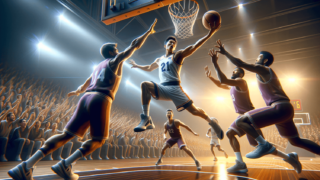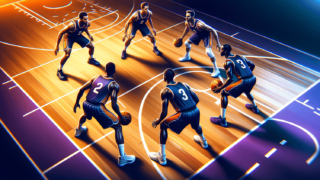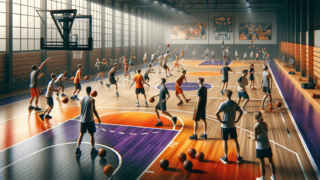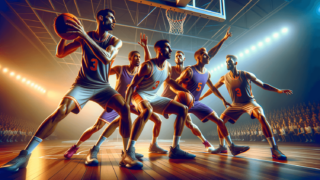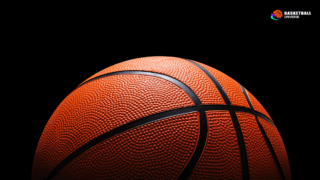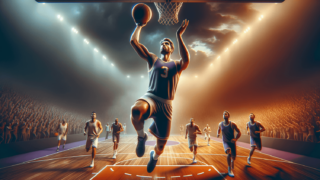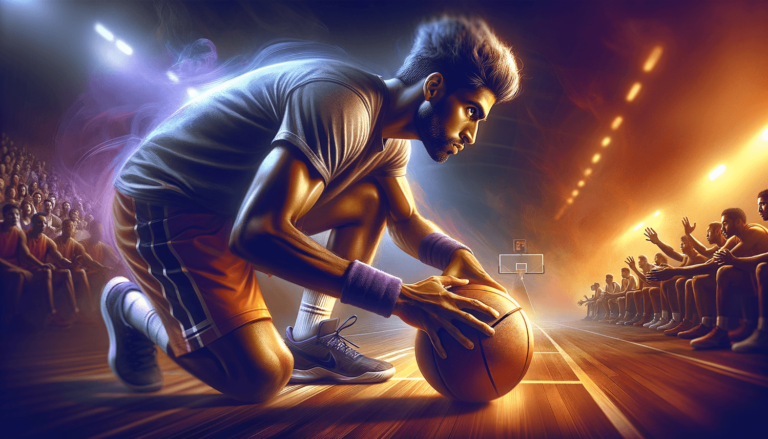
How to Improve Your Decision-Making in Basketball?
Written by: Basketball Universe
Last updated:

Picture yourself orchestrating fast-paced plays, skillfully navigating the court, and executing jaw-dropping shots – every basketball fan’s dream. But what separates good players from great ones? It’s all in the power of decision-making. Welcome to “How to Improve Your Decision-Making in Basketball,” a comprehensive guide that will elevate your mental game to new heights. With a perfect blend of fun and professionalism, this blog post will delve into how strategic thinking, awareness, and basketball IQ can elevate you from a casual baller to an on-court maestro. Whether you’re an aspiring pro or a weekend warrior, get ready for game-changing insights, tips, and tactics that’ll have you outsmarting the opposition in no time.
How to Improve Your Decision-Making in Basketball?
Improving your decision-making in basketball revolves around developing your basketball IQ, heightening your court awareness, practicing under pressure, watching game footage, and learning from experienced players or coaches. Focus on understanding team dynamics, common plays, and the strengths and weaknesses of both teammates and opponents. As you enhance these skills and knowledge, you’ll find yourself making smarter and more effective choices on the court.
Mastering the Art of Basketball IQ
Laying the foundation for better decision-making begins with honing your basketball IQ. Undeniably, this basketball intelligence will help you anticipate the next move, read the floor, and make informed decisions. To see real progress, be prepared to put in work both on and off the court.
Become a Student of the Game
Treat basketball as a subject you want to excel in. Research its rich history and learn about the greats who have left their mark on the sport. Gain a deep understanding of the rules, offensive and defensive strategies, and team dynamics. By immersing yourself in the game, you’ll come to appreciate the intricacies and nuances often overlooked by casual fans.
Know Your Role and Play to Your Strengths
Recognize your distinctive skill set and role within the team. Are you a lights-out shooter, a prolific scorer, a relentless rebounder, or a lockdown defender? Knowing where you excel will help you define your role, allowing you to directly impact the outcome of a game. Owning your strengths and playing to them is the first step towards effective decision-making on the court.
Enhancing Court Awareness
Unsurprisingly, strong situational awareness translates to better decision-making. By boosting your awareness in basketball settings, you’ll be positioned to anticipate moves before they happen and expertly navigate the court.
Watch and Analyze Game Footage
Study game footage of yourself and others—both teammates and opponents. Dissect individual and team tendencies, looking for patterns in winning teams and strategies that opponents struggle with. Observing the game from this more analytical standpoint can grant you a level of insight that will positively impact your in-game decisions.
Improve Peripheral Vision
Peripheral vision is a crucial component of court awareness. Expand your peripheral vision by consciously practicing scanning the court during drills and games. Focus on keeping your eyes up and maintaining a broader field of vision to gather essential information on the fly.
Develop a Pre-Game Routine
Before stepping onto the court, take some time to mentally prep yourself. Picture yourself in various game situations as you go through your pre-game warmups. Familiarizing yourself with these scenarios can significantly improve your instincts and awareness, leading to better in-game decision-making.
Practice, Practice, Practice
Improving your decision-making starts with practice. Develop a training regimen, focusing on increasing your mental and physical conditioning. In addition, challenge yourself with drills that promote quick thinking and decision-making skills.
Perform Decision-Making Drills
There are several drills designed to simulate pressure situations and encourage rapid decision-making. Aim to partake in dynamic drills that emulate fast-paced decision-making environments. Examples include the React Box Drill, Closeout Drill, and Chaser Layup Drill. Practice these religiously to enhance your ability to make split-second decisions under heightened pressure.
Gain Experience through Repetition
Train your body and mind to react faster by repeatedly placing yourself in game scenarios. Participate in organized practices, pick-up games, or even 1-on-1 matchups to reinforce decision-making abilities in a real-time basketball setting.
Focus on Building Chemistry with Teammates
Understanding your teammates and forming strong chemistry is essential for making better decisions during a match. Practice together whenever possible and develop a sense of trust and intuition. Over time, your synergy will lead to seamless communication and improved overall decision-making.
Learn from the Pros and Coaches
On the quest to improve your decision-making, don’t forget about the expertise that surrounds you in the form of coaches and experienced players. Observing and learning from their knowledge and insights can provide invaluable guidance as you strive to reach the next level.
Seek a Mentor
Identify a veteran player, coach, or local basketball expert who can provide constructive feedback and hands-on direction. A mentor can be instrumental in helping you refine your game, whether through skill development or by sharing the subtleties of basketball decision-making.
Engage in Team Discussions
Discuss game strategies, common plays, and possible scenarios with your teammates and coaches in a group setting. These conversations can help you exchange ideas and perspectives, fine-tune your understanding of the game, and improve your decision-making accordingly.
Watch and Analyze Professional and College Games
Observe some of the highest levels of basketball, such as the NBA and NCAA, to witness the best decision-makers in the game. Analyze the individual decisions made by elite point guards like Chris Paul or Stephen Curry to see how they break down defenses, create opportunities for their teammates, and control the game tempo.
Embrace Pressure Situations and Learn from Them
Don’t shy away from pressure situations, as experiencing them can only make you a better decision-maker. Lean into these moments, and look for ways to improve your thought process while learning from your mistakes.
Challenge Yourself to Make Decisions Under Pressure
Place yourself in pressure situations as often as possible to advance your decision-making capabilities. Seek out opportunities like end-of-game simulations or high-stakes basketball situations, such as crunch-time play during pick-up games, to ensure you’re well-equipped to make smart decisions when the stakes are high.
Learn from Mistakes
Don’t be afraid to make mistakes—embrace them as learning opportunities. Reflect on your decisions in high-pressure situations and assess what you could have done differently. Understanding and addressing your weaknesses will serve as a springboard for better decision-making in the future.
Conclusion
In a game as dynamic as basketball, sharpening your decision-making skills can prove truly transformative. The quest for mastery in this domain calls for dedication to building one’s basketball IQ, enhancing court awareness, absorbing knowledge from the pros, and embracing pressure situations. As you garner insights from an array of sources and experiences, you’ll be well on your way to becoming a prolific decision-maker, elevating your game to new heights. Happy Hooping!
Investing in Mental Training
Often overlooked, mental training is a valuable piece of the puzzle when it comes to improving decision-making in basketball. Strengthening your mental game will help you remain composed under pressure and maintain focus on essential aspects of the game that directly impact decision-making.
Develop a Growth Mindset
Cultivate a growth mindset by prioritizing learning and self-improvement. Recognizing that you can always develop your skills enables you to remain open to constructive feedback and encourages constant progress. This mindset will positively influence your decisions on the basketball court, propelling your overall performance forward.
Strengthen Self-Discipline and Concentration
Developing self-discipline and concentration will help you stay focused during games, allowing you to process information more accurately and make better decisions. Establish a regular meditation practice, participate in yoga sessions, or use concentration exercises to improve mental sharpness and basketball decision-making.
Being a Leader on the Court
Great decision-makers often find themselves in leadership roles on the basketball court. A higher level of decision-making is required to excel at these positions, effectively commanding your teammates and dictating the game’s tempo.
Develop Communication Skills
Work on refining your verbal and non-verbal communication skills to convey valuable information to your teammates during games. Being able to relay clear, concise instructions and information at high speed intensifies team chemistry, which in turn benefits decision-making on the court.
Lead by Example
Showcase your commitment to improvement and success by leading from the front. Regularly arrive early to practices and games, volunteer for new challenges, and hold yourself accountable for your actions. These qualities underscore your basketball decision-making prowess and demonstrate leadership ability.
Refining Your Physical Game
Last but not least, don’t forget the relationship between physical skill development and decision-making improvements. Enhance your basketball prowess by investing time and effort into refining your technique and conditioning—these improvements will open up an array of tactical options during games.
Work on Ball Handling
Slashing defenses and making pinpoint passes require strong ball-handling skills. The confidence and agility that comes from fluency in ball handling enable you to make swifter and more effective decisions on the court. Drills such as Dribble Between Cones, Windshield Wiper, and Zigzag Dribble will develop the necessary ball handling abilities.
Incorporate Conditioning Exercises
In addition to practicing basketball-specific training, integrate strength, endurance, and speed exercises into your routine. Building a strong, agile, and swift body will help you react quickly and decisively when required—elements crucial to making better decisions at crucial moments.
By investing in mental training, assuming a leadership role, and refining your physical abilities, you’ll uncover a range of possibilities for improved decision-making. These approaches, coupled with those mentioned earlier, will allow you to reach new heights in your basketball journey and become a formidable force on the court.
Frequently Asked Questions
Here’s a FAQ section that addresses some common questions and concerns you may have about improving your decision-making abilities in basketball. Let’s dive in!
1. How long does it take to see improvements in decision-making?
Improving decision-making is a continuous process that varies depending on individual effort and dedication. While some players may see noticeable improvements within weeks, others might take months to significantly enhance their decision-making skills. Persistently working on basketball IQ, court awareness, and decision-making drills will result in tangible progress over time.
2. Can I improve my decision-making by practicing solo?
While practicing solo helps to polish individual skills, decision-making improvement is best achieved through practicing with a team or participating in games. The dynamic nature of basketball requires constant interaction and adaptation, which only actual game situations can provide.
3. What’s the most effective way to work on decision-making?
There isn’t a single “most effective” method for improving decision-making. It’s essential to approach it from various angles, such as developing basketball IQ, enhancing court awareness, learning from experienced players, and practicing under pressure. Each method complements the others, resulting in a more comprehensive improvement.
4. How do I increase my basketball IQ?
Increasing your basketball IQ requires delving deep into the game by understanding its history, rules, strategies, and intricacies. Research past and present basketball greats, watch and analyze game footage, participate actively in team discussions, and engage with coaches or mentors to expand your understanding of the sport.
5. Are there specific drills to improve decision-making?
Yes, there are specific drills designed to enhance decision-making skills under pressure. Examples include the React Box Drill, Closeout Drill, and Chaser Layup Drill. These exercises simulate fast-paced, pressure-filled situations that encourage quick thinking and rapid decision-making.
6. How can I keep my composure when making decisions under pressure?
Staying composed under pressure starts with exposure to such situations. The more you experience high-stakes scenarios, the better you’ll become at handling them. Additionally, engaging in meditation or mindfulness practices can help you manage stress, develop mental fortitude, and maintain focus during tense basketball moments.
7. How important are communication skills in decision-making?
Effective communication is crucial in decision-making as it enables seamless interaction with teammates, leading to improved in-game decision-making. From verbal instructions to non-verbal cues, clear communication will help guide your team and tactically outsmart opponents.
8. How can I improve my peripheral vision?
Improving peripheral vision requires conscious practice during drills and games. Focus on keeping your eyes up, scanning the court, and maintaining a broader field of vision. By consistently training your eyes under various gameplay situations, your peripheral vision will gradually improve.
9. Can watching professional or college games help with decision-making?
Yes, watching professional and college basketball games can help you observe elite players who excel in decision-making. Analyzing how high-level players create scoring opportunities, break down defenses, and control the game’s tempo will provide valuable insights to refine your own decision-making abilities.
10. Is a mentor necessary for improving decision-making?
A mentor can be highly beneficial in guiding your decision-making improvement, but it’s not a mandatory requirement. Mentors provide hands-on direction, constructive feedback, and insights that can fast-track your progress. However, with self-discipline, dedication, and access to other resources such as books, videos, and game footage, you can still make remarkable strides in decision-making.
Featured Posts
- No pillar pages found.
